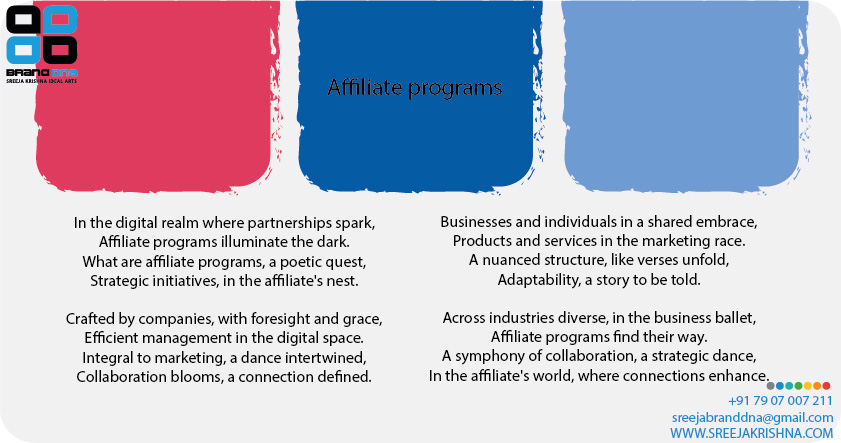A. How to become an affiliate marketer?

Becoming an affiliate marketer is an exciting venture that offers the potential for passive income and entrepreneurial growth. The process involves a series of key steps designed to empower aspiring affiliates with the knowledge and tools needed to embark on a successful journey.

1. Research and Niche Selection

Begin by conducting thorough research to identify a niche that aligns with your interests, expertise, and target audience. Choosing a niche that resonates with you enhances your ability to create compelling content and connect with your audience effectively.
2. Identify Suitable Affiliate Programs

Once you’ve determined your niche, search for affiliate programs offered by companies relevant to your chosen industry. Many companies, ranging from e-commerce giants to niche service providers, run affiliate programs to leverage the marketing prowess of individuals like you.
3. Evaluate Program Terms and Conditions

Carefully review the terms and conditions of each affiliate program you’re considering. Pay attention to commission structures, payment methods, and any restrictions or guidelines imposed by the program. Understanding these details ensures a transparent and mutually beneficial partnership.
4. Join Affiliate Networks (Optional)

Consider joining affiliate networks, which serve as intermediaries connecting affiliates with a multitude of programs. Networks streamline the process of finding suitable programs, consolidating earnings, and providing access to a variety of promotional resources.
5. Complete the Sign-Up Process

To officially become an affiliate, you’ll need to complete the sign-up process for each chosen program. This usually involves filling out an application form where you provide relevant information about your online presence, promotional methods, and the platforms you intend to use.
6. Obtain Unique Affiliate Links

Upon acceptance into an affiliate program, you’ll be provided with unique affiliate links. These links are the linchpin of your affiliate marketing efforts, as they track the traffic and actions generated through your promotions. Embed these links strategically in your content to ensure accurate tracking.
7. Create High-Quality Content

Craft engaging and high-quality content that resonates with your target audience. This can include blog posts, articles, videos, social media content, and more. Your content should seamlessly integrate your affiliate links while providing value to your audience.
8. Implement Various Promotion Strategies

Diversify your promotional strategies to reach a broader audience. This may involve leveraging social media platforms, optimizing your website for search engines, engaging in email marketing, and exploring paid advertising channels. Tailor your approach based on your niche and target audience.
9. Monitor Performance and Optimize

Regularly monitor the performance of your affiliate marketing campaigns using tracking tools and analytics. Analyze key metrics such as click-through rates, conversion rates, and earnings per click. Use these insights to refine your strategies and optimize your campaigns for better results.
10. Stay Informed and Evolve

The landscape of affiliate marketing is dynamic, with industry trends and best practices evolving over time. Stay informed by following industry blogs, participating in forums, and continually educating yourself on new marketing techniques. Adaptability and a willingness to evolve are key to sustained success in affiliate marketing.
By following these steps and maintaining a proactive approach to learning and optimization, aspiring affiliates can establish a solid foundation for a rewarding career in affiliate marketing. As with any entrepreneurial endeavor, patience, persistence, and a commitment to providing value to your audience are integral to long-term success
B. What are affiliate programs?

Affiliate programs serve as strategic initiatives implemented by companies to efficiently manage their relationships with affiliates. These programs are integral to the field of affiliate marketing, fostering collaboration between businesses and individuals seeking to promote their products or services. A more in-depth exploration of affiliate programs reveals their nuanced structure and adaptability across diverse industries and business models.
1. Program Structure

Affiliate programs are structured frameworks that outline the terms, conditions, and guidelines governing the partnership between the company (merchant or advertiser) and the affiliate (publisher). These frameworks typically include details such as commission structures, payment methods, tracking mechanisms, and promotional guidelines.
2. Types of Affiliate Programs

Affiliate programs come in various forms, each catering to different business goals and industries. Some common types include: Pay-Per-Sale (PPS): Affiliates earn commissions based on successful sales generated through their referral links.
Pay-Per-Click (PPC): Affiliates earn commissions for driving traffic to the merchant’s site, irrespective of whether the visitor makes a purchase.
Pay-Per-Lead (PPL): Affiliates earn commissions when their referrals take a specific action, such as signing up for a trial, filling out a form, or subscribing to a newsletter.
3. Affiliate Networks

Many companies choose to collaborate with affiliate networks. These networks act as intermediaries, connecting merchants with a network of affiliates. This streamlined approach simplifies the process for both parties, allowing affiliates to access multiple programs through a single platform and providing merchants with a broader reach.
4. Tracking and Analytics

Integral to affiliate programs is the implementation of robust tracking mechanisms. Affiliate links contain unique identifiers that enable accurate tracking of clicks, conversions, and other essential metrics. Sophisticated analytics provide both merchants and affiliates with insights into the performance of their campaigns.
5. Promotional Resources

Successful affiliate programs often provide affiliates with a suite of promotional resources. These can include banner ads, product images, marketing copy, and other materials that affiliates can use in their promotional efforts. These resources contribute to a cohesive and effective marketing strategy.
6. Affiliate Program Management

Companies dedicate resources to managing their affiliate programs effectively. This involves overseeing affiliate applications, monitoring performance, addressing queries, and ensuring that the program aligns with the company’s overall marketing strategy.
7. Diversity Across Industries:

Affiliate programs showcase remarkable adaptability, thriving in diverse industries. E-commerce companies, service providers, software developers, and content creators alike leverage affiliate marketing to enhance their online presence and drive sales.
8. Mutual Benefit

The essence of affiliate programs lies in creating a mutually beneficial relationship. Companies benefit from increased visibility, expanded reach, and improved sales without incurring upfront marketing costs. Affiliates, in turn, have the opportunity to monetize their online presence by earning commissions for successful referrals.
Conclusion

In essence, affiliate programs represent a structured and mutually advantageous framework that allows companies to tap into the collective marketing efforts of affiliates. This collaborative approach underscores the adaptability of affiliate marketing across various sectors, making it a powerful and scalable strategy for businesses seeking to enhance their digital presence and drive results

